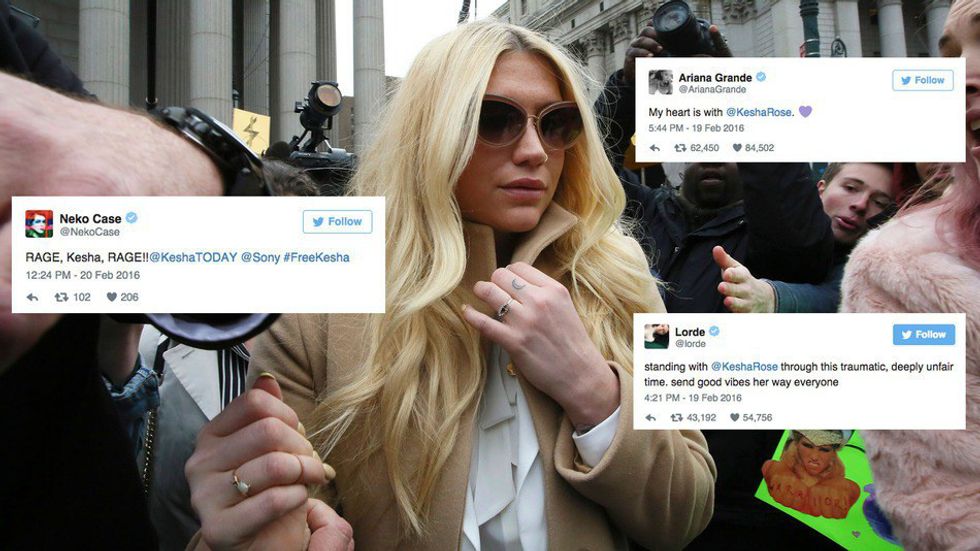On Friday, a Manhattan Supreme Court judge broke the heart of Kesha--28 year old pop singer--when he ruled that her contract with Sony must remain respected.
Kesha, famous for her hits "Tik Tok," "Die Young," and "Your Love is My Drug," had opened up a lawsuit against her producer, Dr. Luke. Kesha claims that she had been raped, drugged, and had suffered emotional and psychological abuse under Dr. Luke. According to her contract with Sony, she has to continue to produce albums under Dr. Luke--or not make music at all.
Dr. Luke's attorney stated after the trial, "We remain confident that when all the facts are presented that Ms. Sebert's allegations against Luke will be shown to be completely false and were asserted solely to extort money and gain contractual leverage."
In other words, the judge ruled that a big-name company contract is way more important than an artist's psychological and physical well-being. He did not allow Kesha to produce music on her own. Her lawsuit was not even an attempt to make sure Dr. Luke answers for her alleged rape.
In even simpler terms, this lawsuit is just another failure of the United States judicial system.
Kesha recounted a rape incident with Dr. Luke, in which she was drugged. She woke up the next morning, naked and confused.
Even though Kesha didn't go to the police, it shouldn't mean her case is any less valid. In a large number of rape cases, the victim feels embarrassed, humiliated, and confused. They are traumatized, and often cope with depression and post-traumatic stress disorder. They often feel guilty, and keep the incident a secret.
People who have the nerve to say, "Well why wouldn't Kesha come clean about what happened to her earlier?" are the entire reason why women who have been sexually assaulted live in fear of sharing their experience.
Rape and sexual assault victims are put through hell in the judicial process. They have to prove to the jury that they were in fact raped, and most of the time people don't automatically assume the victim is telling the truth. They also have to tell their story over and over again, thus forcing them to analyze what happened to them during the terrifying ordeal.
When people criticize a woman who comes out with their rape or sexual assault story anything later than a couple days or weeks after the incident, they are proving how ignorant they really are.
A lot of victims don't share their story because they don't want their loved ones to feel guilty. A lot of them also fear the repercussions they might face if their attacker finds out that she shared her story or is pressing charges. The majority of victims still worry that they will be labeled as a liar, an attention-seeker, or even as a slut or whore for sharing their story. A lot of women (and men) suffer in silence.
Kesha wasn't doing "what every rape victim should do." It takes time for a victim to feel strong enough to take their case to the legal system. For some, that can be immediately after the incident, while for others, it may take years. But her case proves that rape victims will continue to suffer at the hands of the American judicial system.
Sexual assault and rape cases are some of the hardest cases to prove in court. This is because the victim needs evidence if he or she wants their case to be more likely ruled in their favor. Like I've said before, women struggle with a lot of emotions following the crime, and the evidence can really only be collected within three days after a visit to a hospital, where she has to undergo a degrading rape kit procedure.
The punishment for rape varies state to state. It can be as little as a fine to life in prison. A number of factors are taken into consideration: how violent it was, how old the victim was at the time, and whether or not drugs or alcohol were used. If the victim is under the influence of drugs and or alcohol, the maximum sentence for the rapist is 15 years.
Every rape victim has access to a free rape kit examination. Plus, if the victim doesn't wish to release it to the police at that time, the kit is held for a number of years before it is disposed of. In New Jersey, the time limit to present a rape kit to law enforcement is 5 years.
Although rape kits are free to victims, the medication, therapy, and other medical expenses post exam are often not covered by insurance. This is especially true if the victim has become pregnant or infected with a sexually transmitted disease during the attack.
Following the ruling on the lawsuit, the hashtag #FreeKesha was trending on Twitter, Instagram, and Facebook. There was a massive digital outcry that demanded for Kesha's perpetrator to be brought to justice. The younger generation has been overall more sympathetic and more vocal when it comes to rape and sexual abuse cases.
The whole process of how rape cases are handled in the US needs to undergo drastic reconstruction. Maybe instead of automatically assuming a woman or man who was raped is lying, we can be human beings for a little bit and stand by them as they go through coping with what happened to them. Because what happened to them wasn't because of how they dressed, what they drank, what drugs they were slipped, or -- believe it or not -- even what music they produce.
What happened to them was wrong, it is inexcusable, and it is irreparable.























